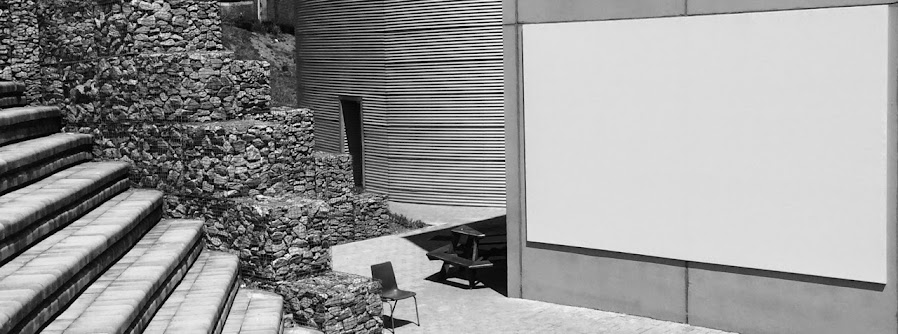 |
| Renee Cox, Yo mama's Pieta, 1996 photograph. courtesy the artist. |
FADA Film screens Through a
Lens Darkly: Black Photographers and the Emergence of a People (formerly
entitled "Reflections in Black")
Image above, Artist Photographer Rene Cox - www.reneecox.org.
Date: Thursday 26 March.
Time: 18:30 - 19:00.
Venue: FADA Aphitheatre
 |
| Still from the documentary, Through a lens darkly. |
Film Information
Through
A Lens Darkly is a
two-hour film that will explore the role of photography, since its rudimentary
beginnings in the 1840s, in shaping the identity, aspirations, and social
emergence of African Americans from slavery to the present.The dramatic arch is
developed as a visual narrative that flows through the past 160 years to reveal
black photography as an instrument for social change, an African American
point-of-view on American history, and a particularized aesthetic vision .
 |
| Still from the documentary, Though a lens darkly. |
Through A Lens Darkly is
inspired by Dr. Deborah Willis's ground breaking book Reflections in Black.
Inspired by Deborah Willis’s book, Reflections in Black, THROUGH A LENS DARKLY (Willis is also a co-producer) casts a
broad net that begins with filmmaker Thomas Allen Harris’s family album. It
considers the difference between black photographers who use the camera to
define themselves, their people, and their culture and some white photographers
who, historically, have demeaned African-Americans through racist imagery. The
film embraces both historical material (African-Americans who were slaves, who
fought in the Civil War, were victims of lynchings, or were pivotal in the
Civil Rights Movement) and contemporary images made by such luminaries as Roy
DeCarava, Gordon Parks, and Carrie Mae Weems. The film is a cornucopia of
Americana that reveals deeply disturbing truths about the history of race
relations while expressing joyous, life-affirming sentiments about the ability
of artists and amateurs alike to assert their identity through the photographic
lens.
 |
| Thomas Allen Director of Through a lens Darkly receiving his award. |
Director and Awards Information
Since Thomas Allen Harris’ January 2014 Sundance premiere of “Through A
Lens Darkly: Black Photographers and the Emergence of a People”, the film has
been selected in over 30 Film Festivals and screened in over 40 theater venues,
museums, film societies and universities, worldwide.
Thomas Allen Harris is honored to have received the NAACP Image Award for “Outstanding
Documentary (Theatrical)” for “Through A Lens Darkly”!
We are also proud to announce the film’s selection by the or
American Library Association (ALA) for their 2015 list of Notable Videos for
Adults!
Finally, “Through A Lens Darkly” premiered on PBS national broadcast on
February 16 on Independent Lens!
Production
(Documentary) A First Run Features release of
a Though a Lens Darkly and ITVS production in association with NBPC. Produced
by Thomas Allen Harris, Deborah Willis, Ann Bennett, Don Perry. Executive producers,
John Singleton, Kimberly Steward, Sally Jo Fifer, Jacquie Jones.
A narrative
that traces from the 19th century to the 21st how African-Americans presented themselves
in their own photos.
Directed by Thomas Allen Harris. Written
by Harris, Don Perry, Paul Carter Harrison, inspired by the book
“Reflections in Black: A History of Black Photographers, 1840 to the Present”
by Deborah Willis. Camera (color/B&W, HD), Martina
Radwan; editors, K.A. Millie, Matthew Cohn;
music, Vernon Reid, Miles Jay; sound, J.T. Takagi, Juan Rodriguez; supervising
sound editor/re-recording mixer/sound designer, Kent Brown.
With Deborah Willis, Lyle Ashton Harris,
Carrie Mae Weems, Thomas Allen Harris, Hank Willis Thomas, Robin Kelly, Renee
Cox.
 |
| Syracuse artist Carrie Mae Weems. SYRACUSE homepage, 2015. |
The Artist Carrie Mae Weems, featured in the film (image above) had this to say about the documentary.
Photographers, art historians and filmmakers will be the benefactors of the history exposed in "Through a Lens Darkly." "So it lays the groundwork, I think, for important stories and narratives that are to come. And that's kind of significant,” cited by Melinda Johnson, syracuse homepage, 2015.
REVIEWS
Mr.
Harris’s film is a family memoir, a tribute to unsung artists and a lyrical, at
times, heartbroken, meditation on imagery and identity. The film is always
absorbing to watch, but only once it’s over do you begin to grasp the extent of
its ambitions, and just how much it has done within a packed, compact hour and
half… Mr. Harris marshals an impressive collection of scholars, artists and
photojournalists to help us understand what we see… He is a wise and passionate
guide to an inexhaustibly fascinating subject. Review by A.O.
Scott, The New York Times
- to read the full review.
A
sweeping Gonzalez, The New
York Times online
“An
exhilarating approach to the history of representation. Presents a plethora of
material triggering a re-evaluation of the visual history of the United States,
as well as what we thought we understood about race, gender and sexuality. The
connections (the filmmaker) draws are rigorous, intellectually challenging, and
astonishingly moving.” Review by Bérénice Reynaud, Festival Reports
Through a Lens Darkly: Black Photographers and the
Emergence of a People A review by Dennis Harvey
This polished documentary chronicles the 'hidden images'
captured by black photographers over 170 years.
A timely reminder of
how images of African-Americans have been stereotyped and demonized by popular
media, “Through a Lens Darkly” recounts the lengthy history of that
misrepresentation while also celebrating the contrasting, oft-overlooked work
of black photographers. Inspired by scholar/museum curator Deborah Willis’ 2002
tome “Reflections in Black,” a definitive study of those artists, ’ Thomas Allen Harris polished documentary feature makes its theatrical
bow at New York’s Film Forum on Aug. 27. While bigscreen impact will
be minor, classroom and educational broadcast life will be long.
As first-person narrator, veteran photographer/filmmaker Harris
initially appears to be imposing a gratuitous autobiographical element on a
much larger story, stressing the “hurt and shame of absence” brought on by his
father’s early abandonment as a microcosm of blacks’ marginalization from
mainstream American history. But he soon turns over the mic to many other
relevant voices and ballasts his own, as we realize his family (at least on his
mother’s side) had devoted to chronicling itself via photographs going back
many generations. Preserved in family albums, these images of upwardly mobile
dignity were —as Willis found in her career-long, broader research — an
antithesis to popular “darkie” stereotypes.
The latter are vividly recalled in montages of offensive advertisements,
films, staged “humorous” shots, et al., which depicted blacks as buffoons,
criminals and/or savages. A particularly appalling section flashes back to the
lengthy vogue for grisly lynching, in which charred, mutilated and hung corpses
are shown, usually surrounded by gloating white vigilantes and spectators.
Incredibly, these constituted a cottage industry for some years, being sold and
treated like novelty postcards.
But the primary focus here is on the contrasting legacy of black
photographers, which Harris and Willis trace back as far as a Cincinnati
daguerrotype maker of the 1840s, whose customers included well-to-do black
families and white abolitionists. Those who followed usually served the black
community exclusively, capturing formal portraits of middle-class
respectability and accomplishment that were a far cry from the more popular
“race” imagery ofthe day. Activist leaders like Frederick Douglass and W.E.B.
Du Bois (who curated an exhibit of photographed African-American life at a
Parisian World’s Fair) stressed the importance of a dignified personal
presentation, even if that meant copying the demeanor and dress of the white
bourgeoisie.
There are brief portraits here of several star shutterbugs, from Harlem
Renaissance chronicler James Van Der Zee to Gordon Parks (whose work for Life
and Vogue magazines was a major glass-ceiling-breaker) and Roy DeCarava. The
chronological narrative doesn’t extend much past the civil rights era; instead,
the pic weaves in commentary throughout from modern artists in various media
(including Carrie Mae Weems and Renee Cox) whose work often appropriates and
reinterprets the inflammatory African-American depictions of the mainstream
yore. The point, as ever, is for to “the Negro … to find some image of himself
or herself that is not demeaning,” as James Baldwin put it a half-century ago.
Though a tad uneven, as a whole the documentary cannily juggles an
overview of African-American history in general with the specifics of its photographic
representation and talents. Harris sometimes echoes the work of his late mentor
Marlon Riggs (“Tongues Untied”) in poetic editorial rhythms, while elsewhere
hewing to a more straightforward PBS-style approach.
Images featured on the blog post is courtesy of 1World1Family - Join the Family!, a national project to connect communities and history through our family photographic archives.



